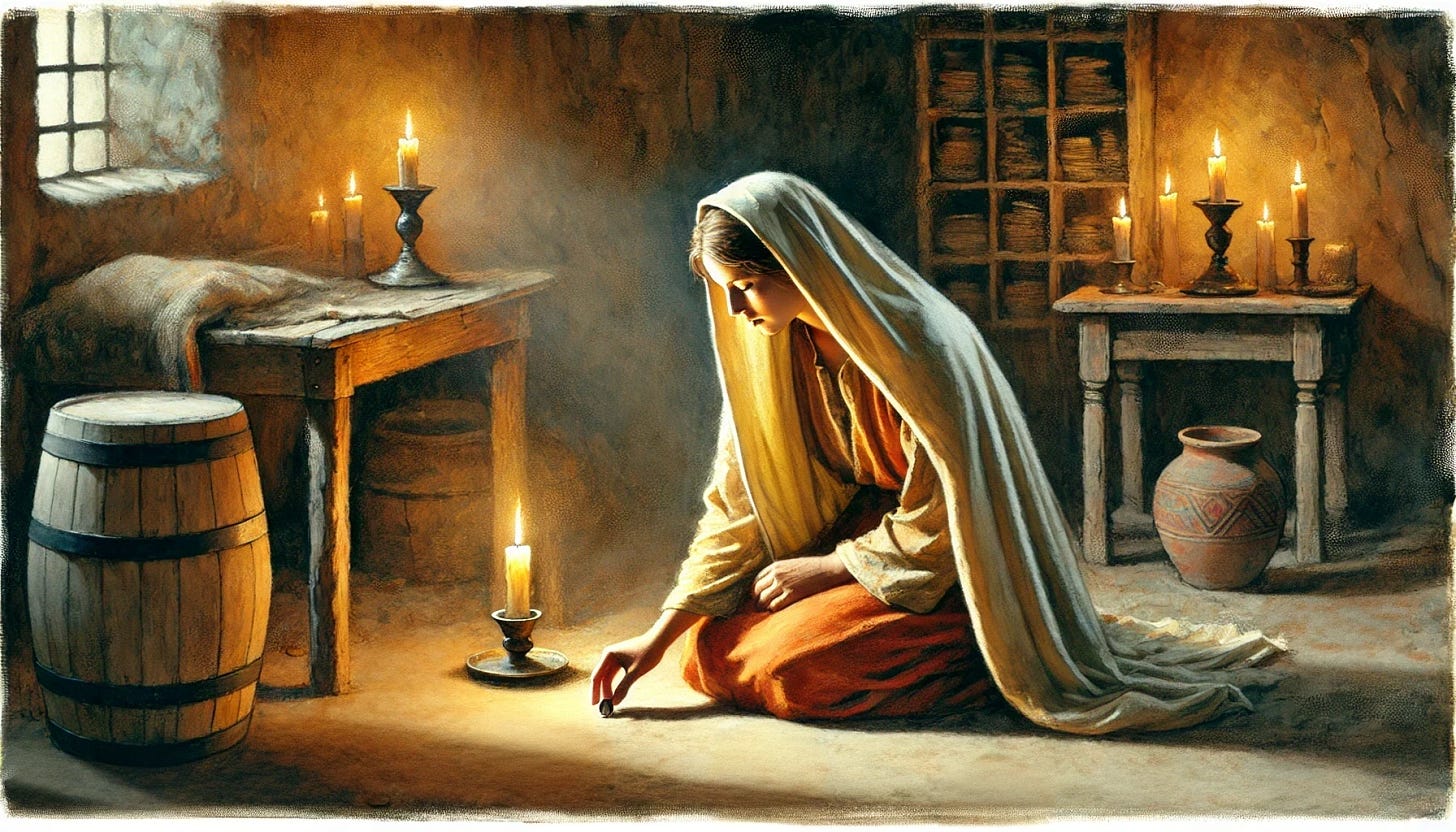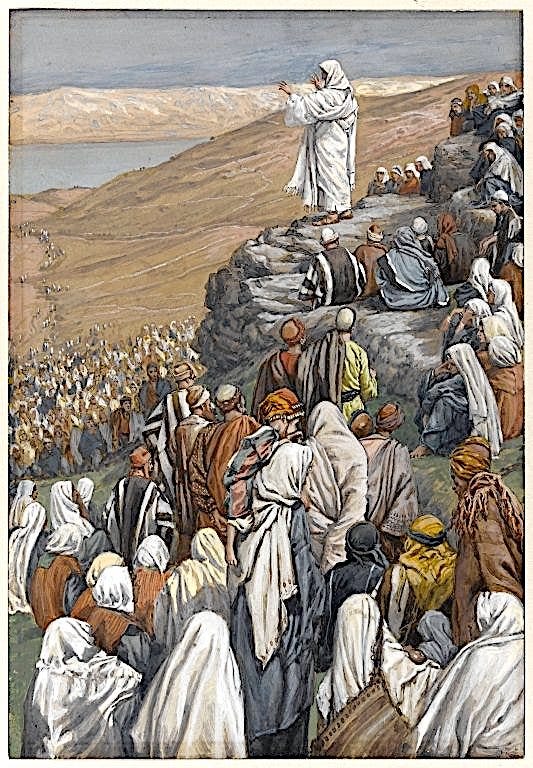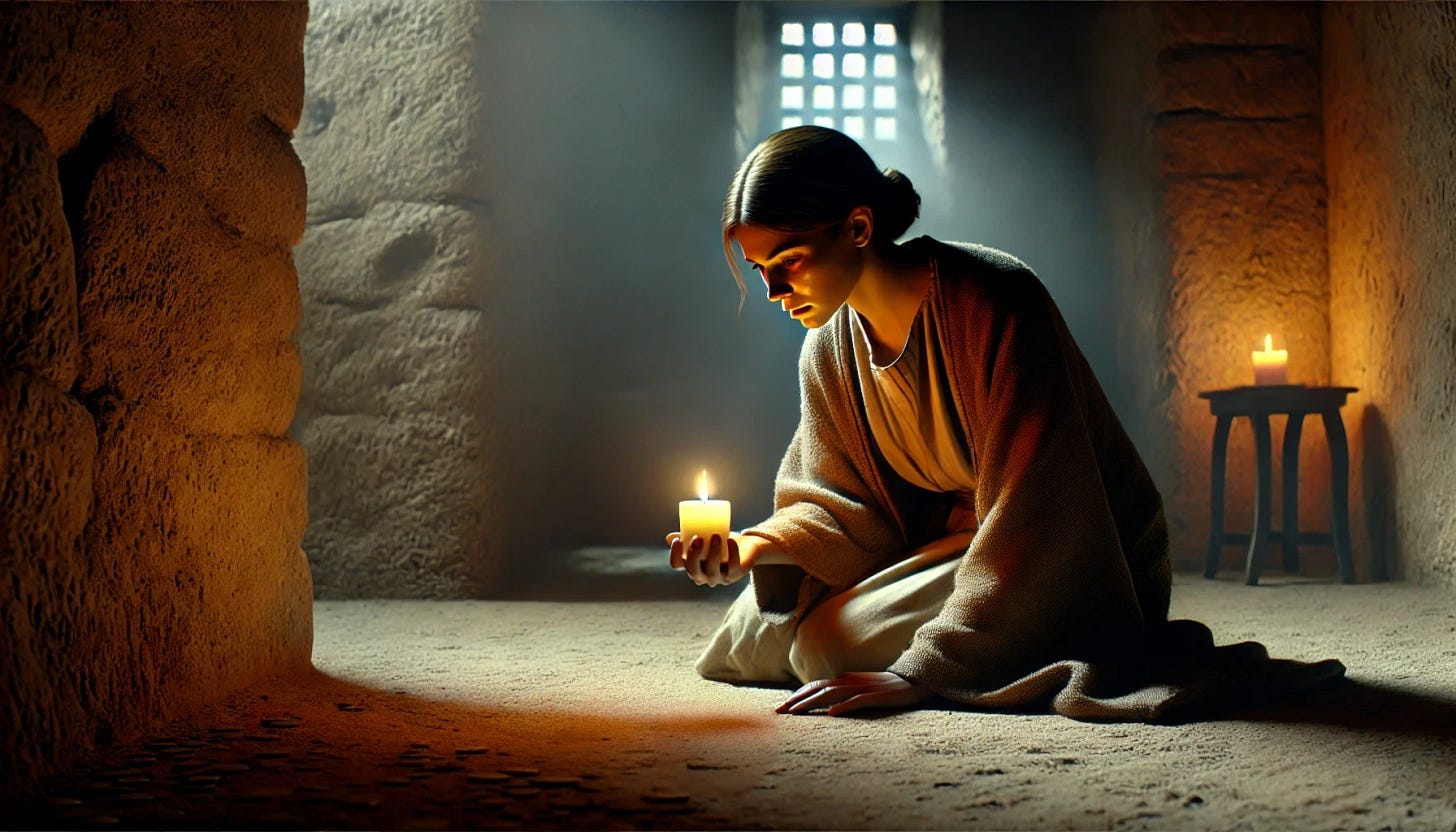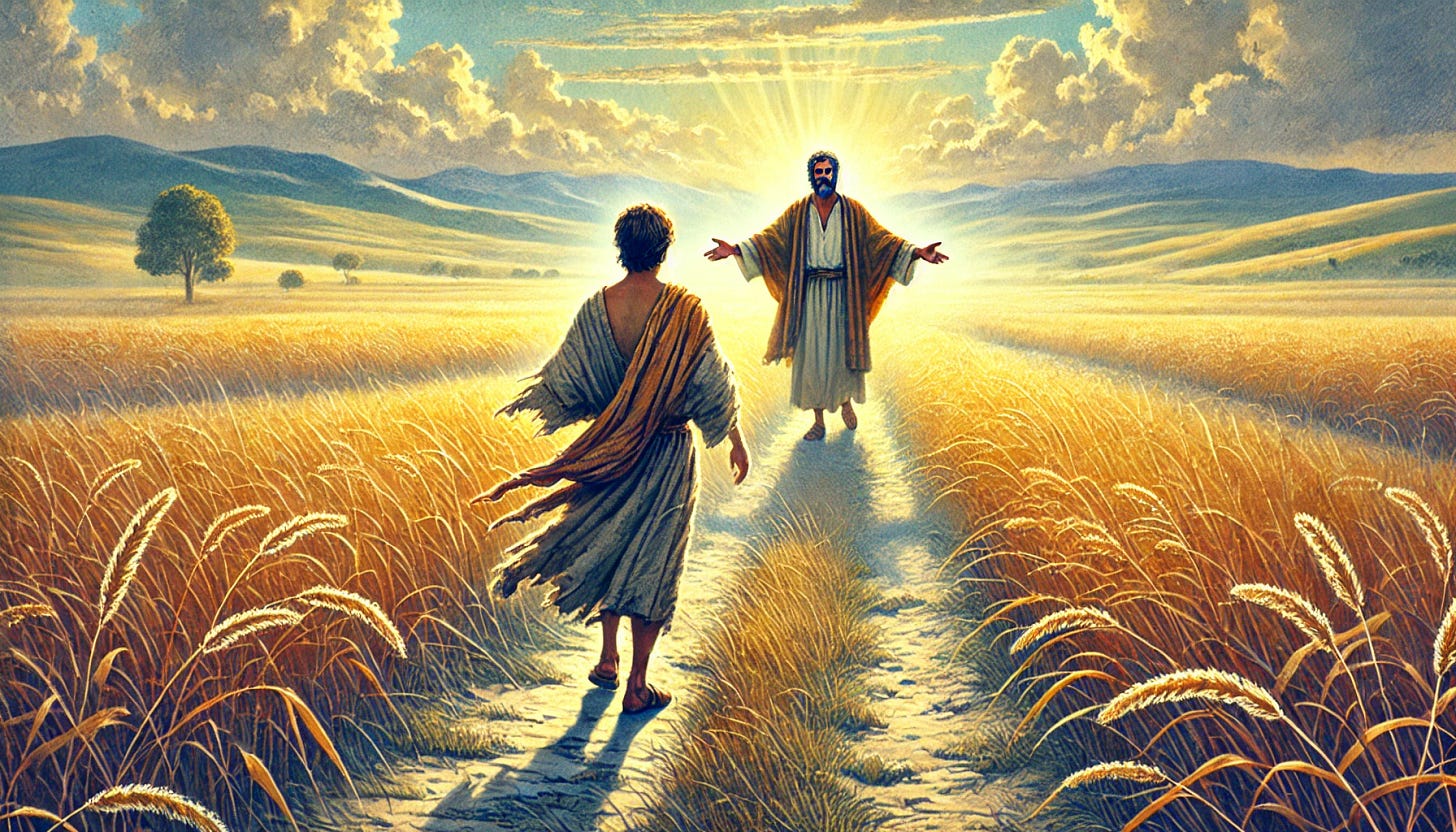The Joy of Finding What was Lost
Homily for the Thursday of the 31st Week in Ordinary Time, Daily TV Mass
“The Lost Coin”, DALL-E, AI-Generated. Thanks to: National Catholic Broadcasting Council
Let hearts rejoice who search for the Lord. (Psalm 105:3)
Jesus Teaches His Disciples on the Journey to Jerusalem
Today’s Gospel is taken from the so-called “travel section” of Luke’s Gospel, which describes Our Lord’s ‘journey up to Jerusalem.’ It is there that the key events of our salvation will unfold: from the passion and death of Jesus to His resurrection, His ascension and the outpouring of the Holy Spirit at Pentecost.
And as Our Lord journeys together with His disciples, we find Him teaching once again in Parables. And several things emerge for our reflection.
“The Sermon of the Beatitudes”, James Tissot, via Wikimedia Commons
The Language of the Parables of Jesus
First of all, as I have said on other occasions, in these Parables – or “teaching stories” – we find Jesus speaking of weeds and wheat, of good soil and bad, of a hidden treasure, a pearl of great price, and of lost sheep.
As scholars observe, the language of the parables is drawn from the everyday world of His audience. We should note that the social perspective of the parables is very much that of the poor of Our Lord’s time. Here, as commentators observe, the parables offer a view of life ‘as seen through the eyes of a servant looking out through a door onto the world of their master.’
Beneath the quaint language of the parables, Jesus is unleashing a rather scathing critique aimed at the attitudes of the elites of His time. Ultimately, beneath the simple language of the parables, Our Lord offers us a profound and compelling vision of God’s presence and transforming power at the very heart of everyday life.
In the world of the parables God is very near to us. God wants to show us His love and mercy. He wants to share the powerful transforming graces that are ours through the life of faith and the life of holiness, as the lives of the Saints show us. What helps give the parables their universal appeal is precisely this vision of God’s presence and grace at work in our everyday life.
“The Lost Coin”, DALL-E, AI-generated. Thanks to National Catholic Broadcasting Council
Seeking and Finding “What Was Lost”
Secondly, as we focus on the parables in today’s Gospel, Jesus speaks to us of people who have lost something: the shepherd who goes out in search of the lost sheep and the woman in search of a lost coin. Jesus will go on to speak of the father whose ‘prodigal son’ was lost morally and spiritually to a life of excess. In each case, we see how the loss is accompanied by the experience of a genuine crisis.
We see the great efforts made by the persons described to recover what was lost. And in each case, Our Lord recounts the joy of finding what was lost, but also the great rejoicing of those who share in the discovery. Ultimately, Jesus invites us to reflect upon the joy in heaven over the one sinner who repents. For as commentator Henry Burton once observed, Jesus wants to show us:
How Heaven seeks after the lost of the earth, and how heaven rejoices when what was lost, is found (see Luke 15:6-7, .9-10, .23-24).
“The Return of the Prodigal Son”, DALL-E, AI-generated. Thanks to National Catholic Broadcasting Council
And I think that these parables have a great deal to say to us in our postmodern, post-truth world today. For we live in an era that has witnessed the loss of the sense of the existence of the transcendent God.
Theologians speak of “the eclipse of God.” But it is important to see how, along with the eclipse of God, we are witnessing “the eclipse” of the sense of the greatness of the human person, created in God’s image and likeness. For in the words of one philosopher, “where there is no God, there is no humanity either.” Church documents speak of the ‘crisis of the sense of sin’ in our time, (Novo Millennio Ineunte, 37).
St. Pope John Paul II speaks of:
The obscuring of the moral and religious conscience; the lessening of the sense of sin; of the distortion of the concept of repentance, and the lack of effort to live an authentically Christian life.
Decades earlier Pope Pius XII observed that:
The sin of the century is the loss of the sense of sin.
Or as Catholic Philosopher, Etienne Gilson observes: ‘the real trouble in our own time’ is not the ‘multiplication of sinners,’ but ‘the disappearance of sin,’ “as the voice of God no longer resounds within the depths of the conscience of the human person.”
When the shepherd and the woman described in today’s Gospel realize that they had lost something, they set out earnestly in search of it.
But in our post-modern, post-human era, how many people recognize what has been lost? Ours is a time when for so many there is no God. It is a time when humanity no longer strives to live in accord with the God-image within us.
We have witnessed a profound change – indeed an utter distortion – of our basic understanding of mercy, as in the case of euthanasia, or “mercy killing,” now referred to by some, as “medical assistance in dying.”
Keeping Our Lamps Lit and Protecting Our own Treasure
Finally, as Advent approaches, we are called once more to live our faith authentically, deeply, in all of its dimensions: drawing closer to the God of love and mercy.
St. Gregory of Nyssa reminds us of the importance of keeping our own lamps lit, so as to safeguard our own everlasting treasure, which is the image of God within us. For he warns of the darkening and obscuring of the divine image within our hearts.
Of course, today’s parables have a happy ending. And we should always remember that the parables speak to us very powerfully of the ‘newness’ of life that God is in the process of bringing about in Christ: the newness of life that God wants to give humanity through His love and mercy.
They speak to us of the great and marvelous offer of God’s grace in the midst of the sinfulness, brokenness, and imperfection that surround us.
They speak of the newness which is ultimately a share in the transforming power of Christ, again, as the lives of the Saints show us.
And so, we see the great importance of drawing close to the wellsprings of God’s mercy in the Sacrament of Reconciliation; in the Eucharist, and in the life of prayer and the Spirit.
“Eucharistic Adoration”, DALL-E, AI-generated. Thanks to National Catholic Broadcasting Council
Extending the Light, Love and Mercy of God to Others
Let us extend God’s own mercy to others: to the lost, the lonely, and the abandoned of our society, to the poor, the hungry, to the growing numbers in our world who live on the margins or “peripheries” of society: all those for whom Christ Himself showed a special love and concern.
St. Augustine speaks of the “healing power of mercy.” And in addition to the corporal works of mercy, let us exercise the spiritual works of mercy as we console others, instruct, advise, and comfort all who are in need of our support and attention. And in our dealings with others, we should always remember Our Lord’s own example of patience and forbearance with His disciples.
Let us pray for the grace to cultivate those spiritual conditions of prayer and contemplation within ourselves which are most conducive to our lifelong growth in holiness.
And let us pray that having experienced God’s mercy in our own lives –
through the Eucharist,
through the Word of God,
and through the sacrament of Reconciliation,
that we may live the Gospel so as to win as many people as possible to Christ, as St. Paul reminds us in 1 Cor. 9:19, drawing them closer to the fonts of God’s light, mercy and love.
I invite you to view the National Catholic Broadcasting Council’s Daily TV Mass below. The Homily begins at 6:11:






